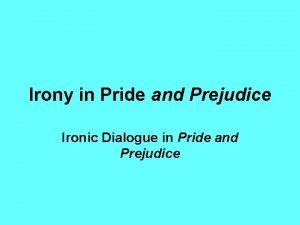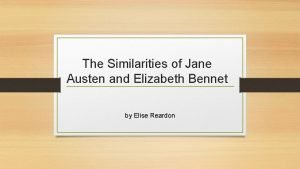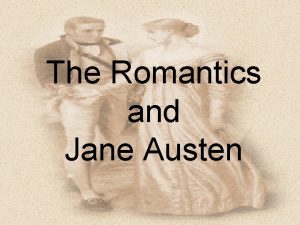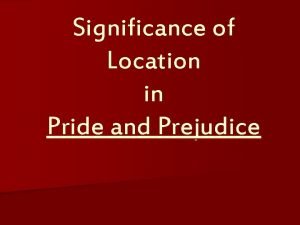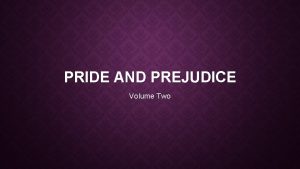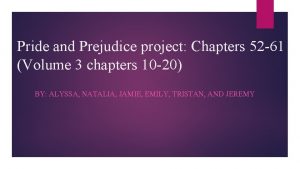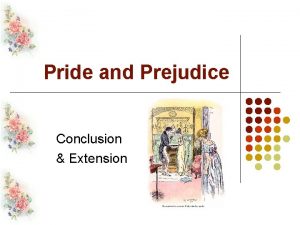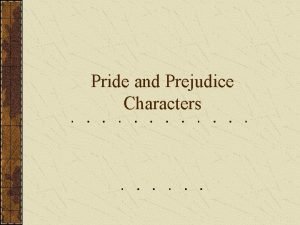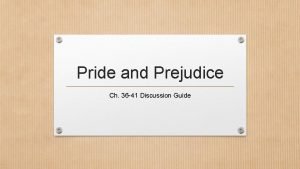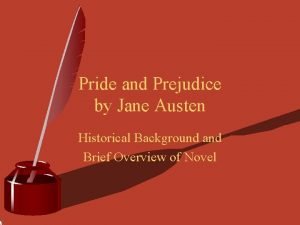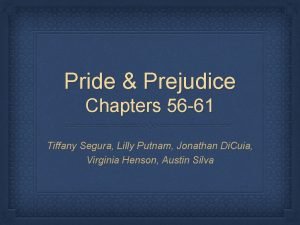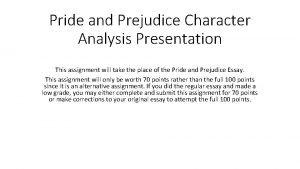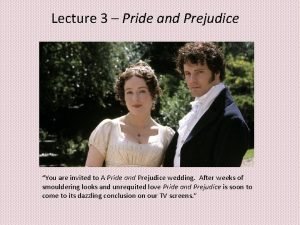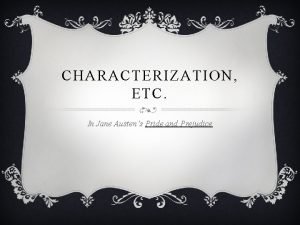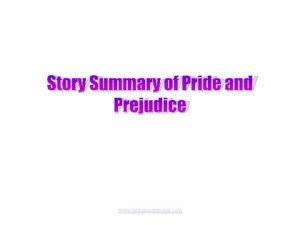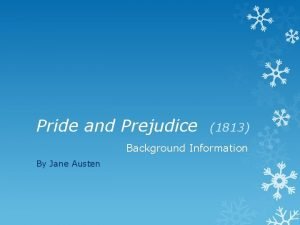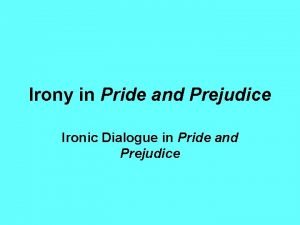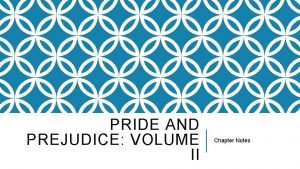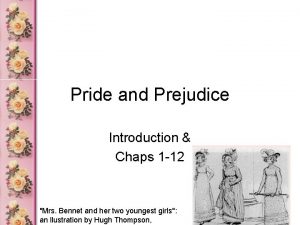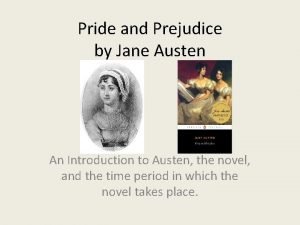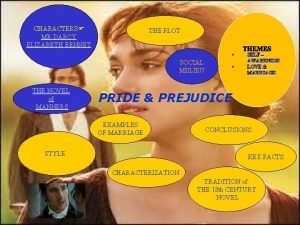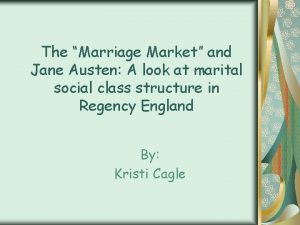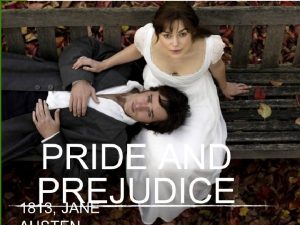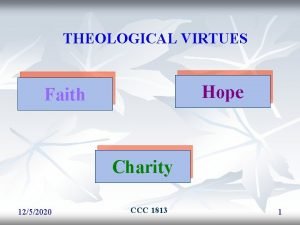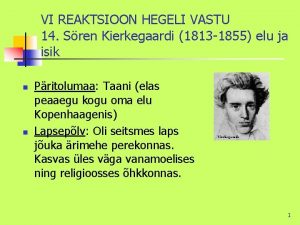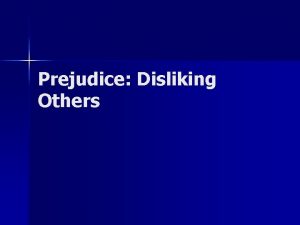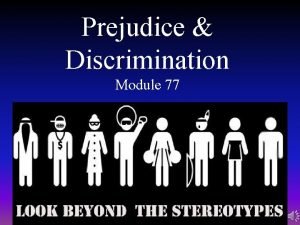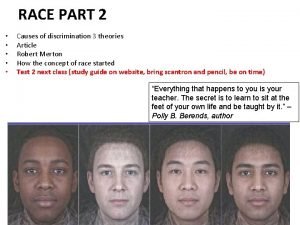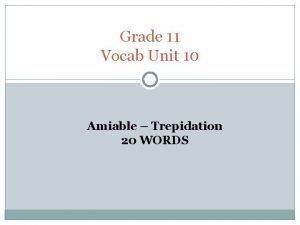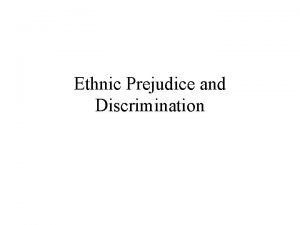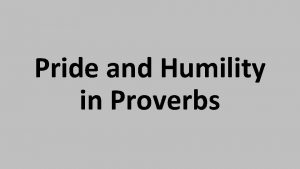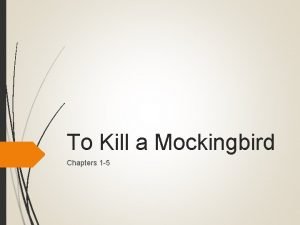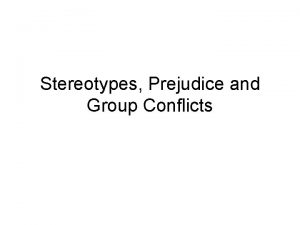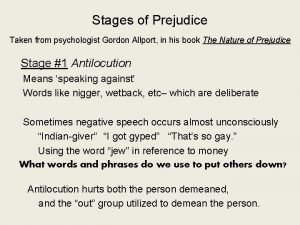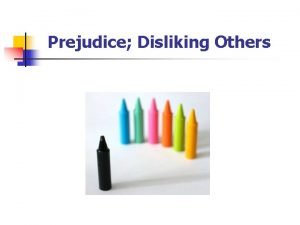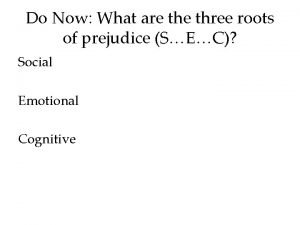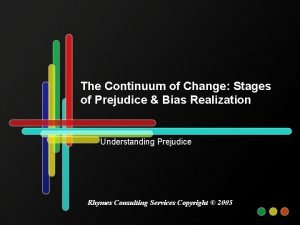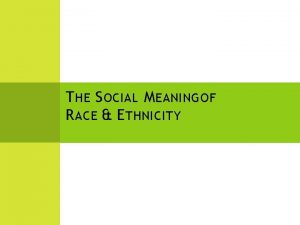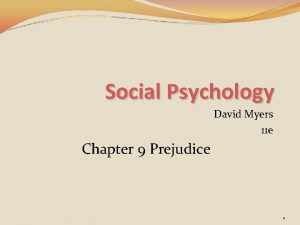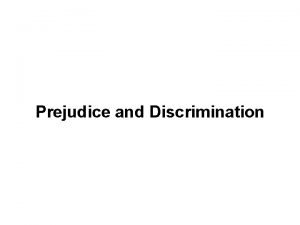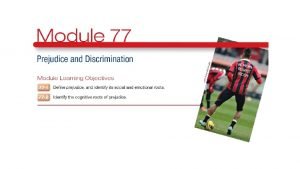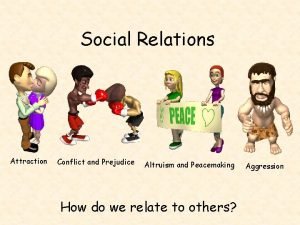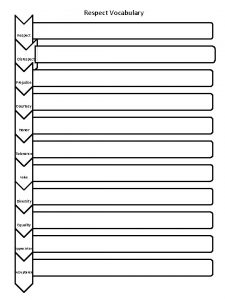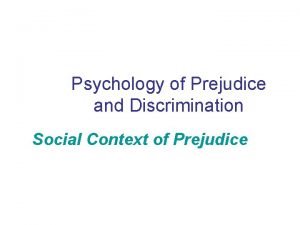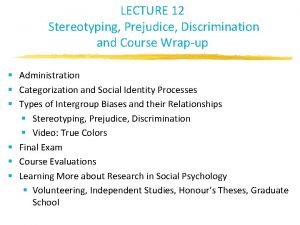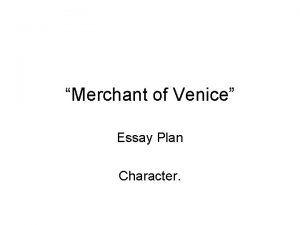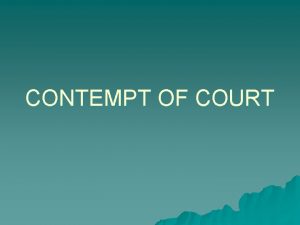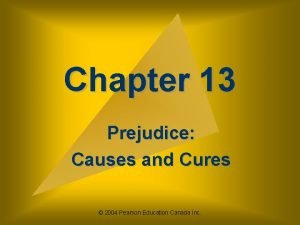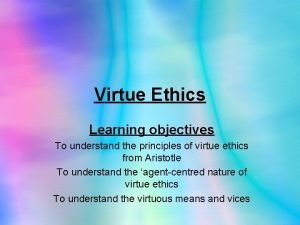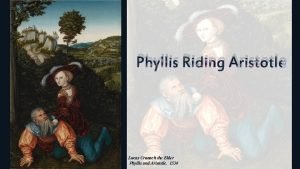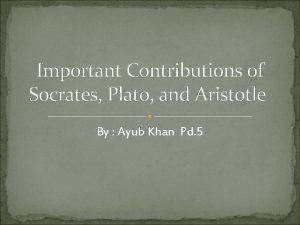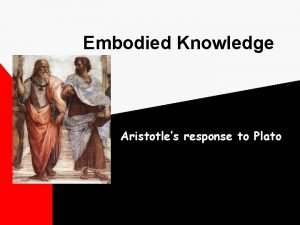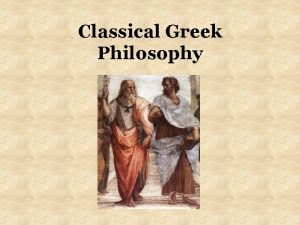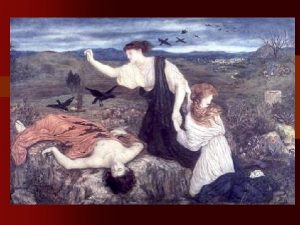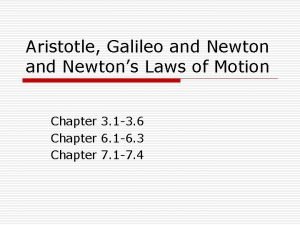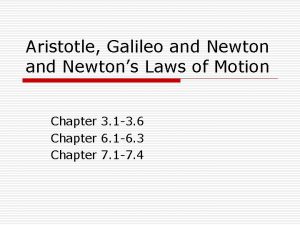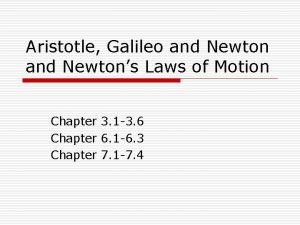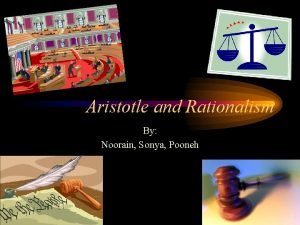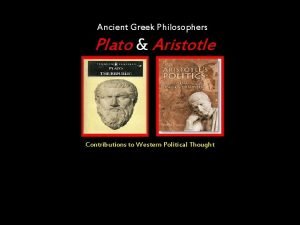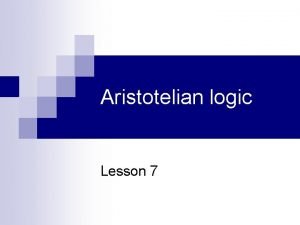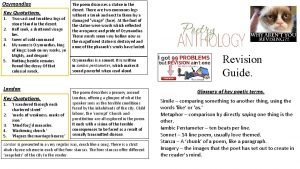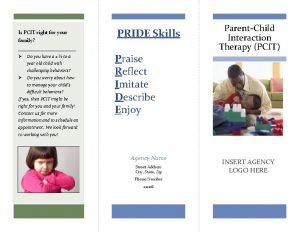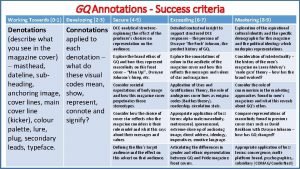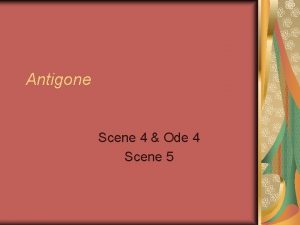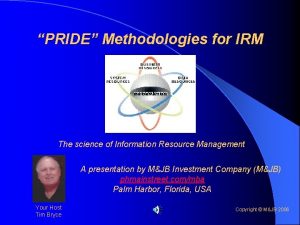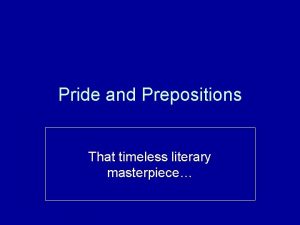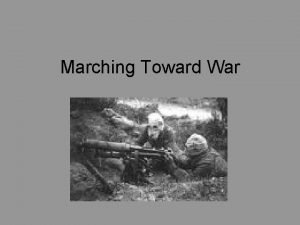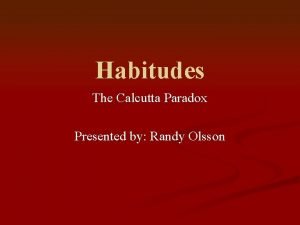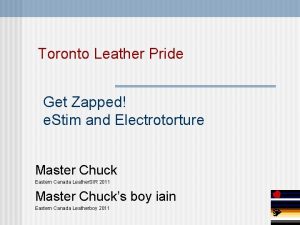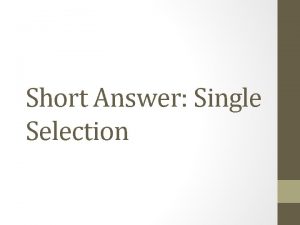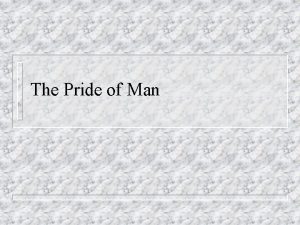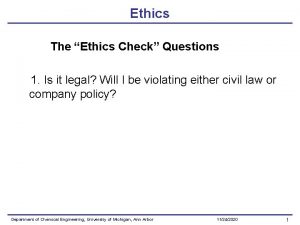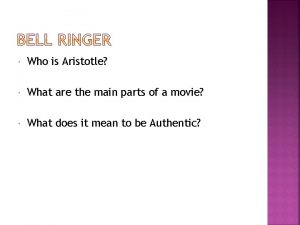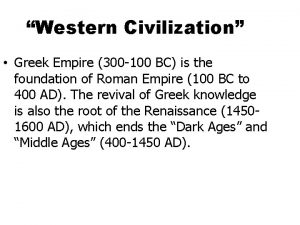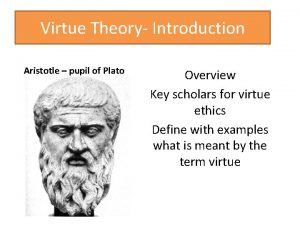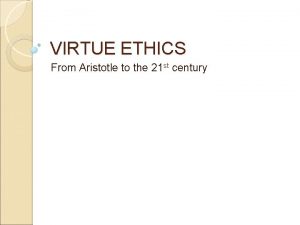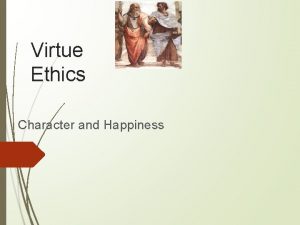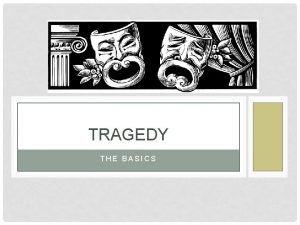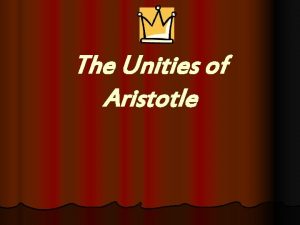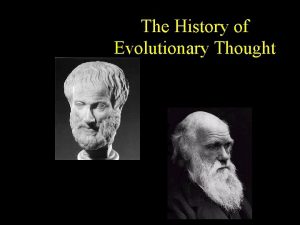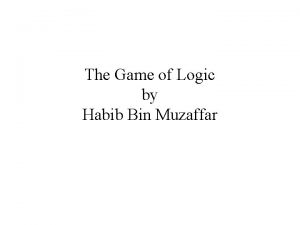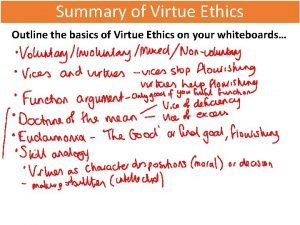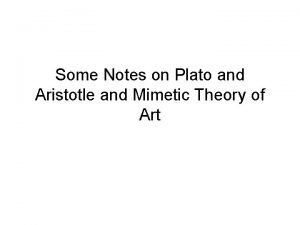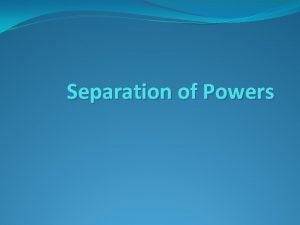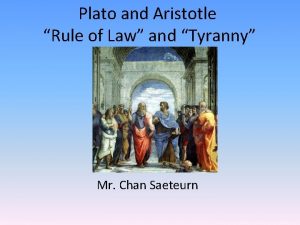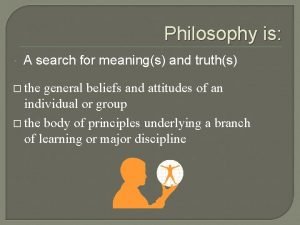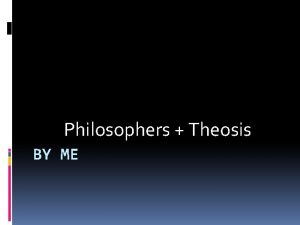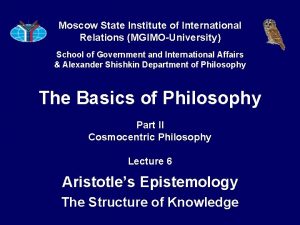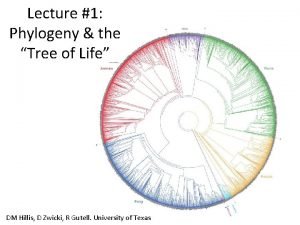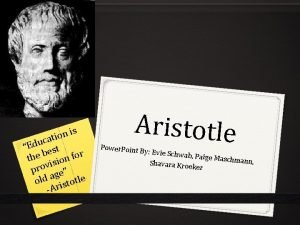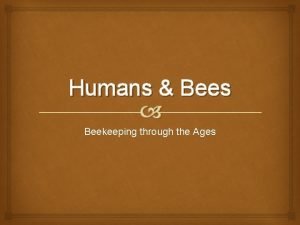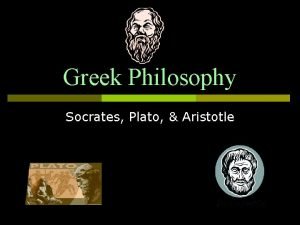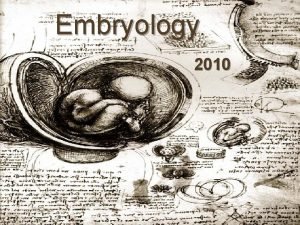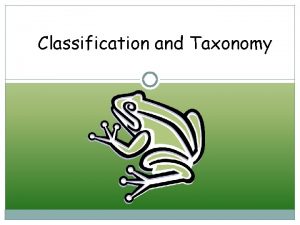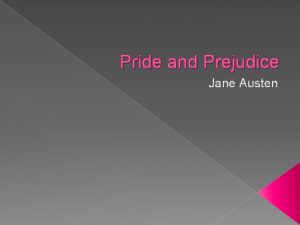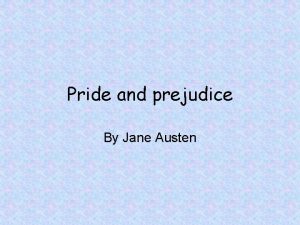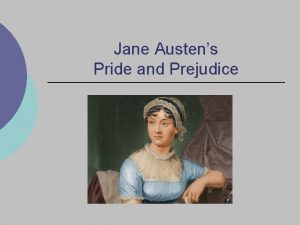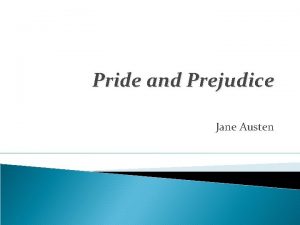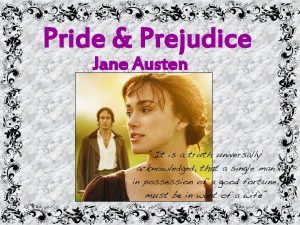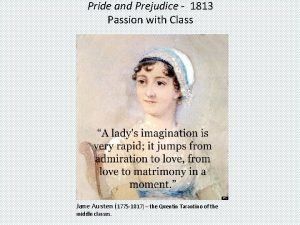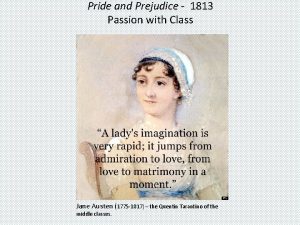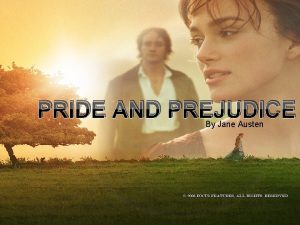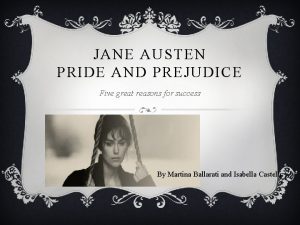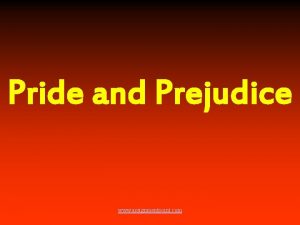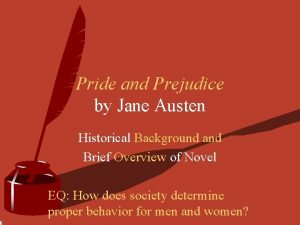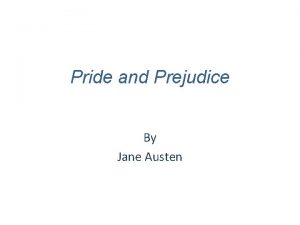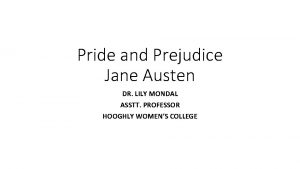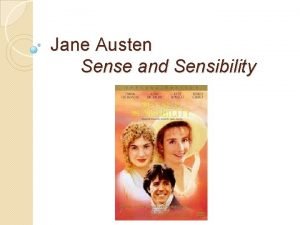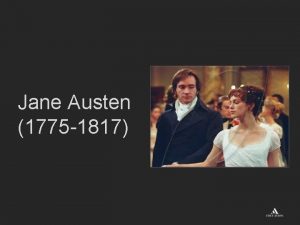Jane Austen Pride and Prejudice 1813 Aristotle Jane








































































































![Ø Narrative Technique Ø It also became associated with sentimental and moral philosophy WP] Ø Narrative Technique Ø It also became associated with sentimental and moral philosophy WP]](https://slidetodoc.com/presentation_image_h2/6ed7dbedd260fd78cddee55dec70a6ee/image-105.jpg)














































- Slides: 151

Jane Austen Pride and Prejudice 1813

Aristotle Jane Austen 384 -322 B. C. 1775 -1817 (42)



Ø The Characters Ø Elizabeth Bennet – the second eldest of the Bennet daughters, she is twenty years old and intelligent, lively, playful, attractive, and witty – but with a tendency to form tenacious and prejudicial first impressions. Ø As the story progresses, so does her relationship with Mr Darcy. Ø The course of Elizabeth and Darcy's relationship is ultimately decided when Darcy overcomes his pride, and Elizabeth overcomes her prejudice, leading them both to surrender to their love for each other.

Ø The Characters Ø Mr Fitzwilliam Darcy – Mr Bingley's friend and the wealthy, twenty-eight-year-old owner of the family estate of Pemberley in Derbyshire, rumoured to be worth at least £ 10, 000 a year (£ 796, 000 or $1, 045, 000 in today's money). Ø While he is handsome, tall, and intelligent, Darcy lacks ease and social graces, and so others frequently mistake his initially haughty reserve and rectitude as proof of excessive pride (which, in part, it is). Ø A new visitor to the village, he is ultimately Elizabeth Bennet's love interest.

Ø The Characters Ø Mr Bennet – A late-middle-aged landed gentleman of a modest income of £ 2000 per annum, and the dryly sarcastic patriarch of the now-dwindling Bennet’s family (a family of Hertfordshire landed gentry), with five unmarried daughters. Ø His estate, Longbourn, is entailed to the male line. Ø Mrs Bennet (née Gardiner) – the middle-aged wife of her social superior, Mr Bennet, and the mother of their five daughters.

Ø The Characters Ø Mrs Bennet is a hypochondriac who imagines herself susceptible to attacks of tremors and palpitations (her "poor nerves"), whenever things are not going her way. Ø Her main ambition in life is to marry her daughters off to wealthy men. Ø Whether or not any such matches will give her daughters happiness is of little concern to her.

Ø The Characters Ø Jane Bennet – the eldest Bennet sister. Ø Twenty-two years old when the novel begins, she is considered the most beautiful young lady in the neighbourhood and is inclined to see only the good in others (but can be persuaded otherwise on sufficient evidence). Ø She falls in love with Charles Bingley, a rich young gentleman recently moved to Hertfordshire and a close friend of Mr Darcy.

Ø The Characters Ø Mary Bennet – the middle Bennet sister, and the plainest of her siblings. Ø Mary has a serious disposition and mostly reads and plays music, although she is often impatient to display her accomplishments and is rather vain about them. Ø She frequently moralises to her family.

Ø The Characters Ø Catherine "Kitty" Bennet – the fourth Bennet daughter at 17 years old. Ø Though older than Lydia, she is her shadow and follows her in her pursuit of the officers of the militia.

Ø The Characters Ø She is often portrayed as envious of Lydia and is described a "silly" young woman. Ø However, it is said that she improved when removed from Lydia's influence. Ø Lydia Bennet – the youngest Bennet sister, aged 15 when the novel begins.

Ø The Characters Ø She is frivolous and headstrong. Ø Her main activity in life is socializing, especially flirting with the officers of the militia. Ø This leads to her running off with George Wickham, although he has no intention of marrying her. Ø Lydia shows no regard for the moral code of her society: she "feels without reasoning. ”

Ø The Characters Ø Charles Bingley – a handsome, amiable, wealthy young gentleman from the north of England (possibly Yorkshire, as Scarborough is mentioned, and there is, in fact, a real-life town called Bingley in West Yorkshire), who leases Netherfield Park, an estate three miles from Longbourn, with the hopes of purchasing it. Ø He is contrasted with Mr Darcy for having more generally pleasing manners, although he is reliant on his more experienced friend for advice.

Ø The Characters Ø An example of this is the prevention of Bingley and Jane's romance because of Bingley's undeniable dependence on Darcy's opinion. Ø He lacks resolve and is easily influenced by others; his two sisters, Miss Caroline Bingley and Mrs Louisa Hurst, both disapprove of Bingley's growing affection for Miss Jane Bennet.

Ø The Characters Ø Caroline Bingley – the vainglorious, snobbish sister of Charles Bingley, with a dowry of £ 20, 000. Ø Miss Bingley harbours designs upon Mr Darcy, and therefore is jealous of his growing attachment to Elizabeth. Ø She attempts to dissuade Mr Darcy from liking Elizabeth by ridiculing the Bennet family and criticising Elizabeth's comportment. Ø Miss Bingley also disapproves of her brother's esteem for Jane Bennet, and is disdainful of society in Meryton.

Ø The Characters Ø Her wealth (her dowry gives her an income of £ 1, 000 per annum, which she overspends) and her expensive education seem to be the two greatest sources of Miss Bingley's vanity and conceit; Ø Likewise, she is very insecure about the fact that her and her family's money all comes from trade, and is eager both for her brother to purchase an estate, ascending the Bingleys to the ranks of the Gentry, and for herself to marry a landed gentleman (i. e. Mr Darcy).

Ø The Characters Ø The dynamic between Miss Bingley and her sister, Louisa Hurst, seems to echo that of Lydia and Kitty Bennet's; Ø That one is no more than a follower of the other, with Caroline in the same position as Lydia, and Louisa in Kitty's (though, in Louisa's case, as she's already married, she's not under the same desperation as Caroline). Ø Louisa is married to Mr Hurst, who has a house in Grosvenor Square, London.

Ø The Characters Ø George Wickham – Wickham has been acquainted with Mr Darcy since infancy, being the son of Mr Darcy's father's steward. Ø An officer in the militia, he is superficially charming and rapidly forms an attachment with Elizabeth Bennet. Ø He later runs off with Lydia with no intention of marriage, which would have resulted in her and her family's complete disgrace, but for Darcy's intervention to bribe Wickham to marry her by paying off his immediate debts.

Ø The Characters Ø Mr William Collins – Mr Collins, aged 25 years old as the novel begins, is Mr Bennet's distant second cousin, a clergyman, and the current heir presumptive to his estate of Longbourn House. Ø He is an obsequious and pompous man who is excessively devoted to his patroness, Lady Catherine de Bourgh. Ø Lady Catherine de Bourgh – the overbearing aunt of Mr Darcy.

Ø The Characters Ø Lady Catherine is the wealthy owner of Rosings Park, where she resides with her daughter Anne and is fawned upon by her rector, Mr Collins. Ø She is haughty, pompous, domineering, and condescending, and has long planned to marry off her sickly daughter to Darcy, to 'unite their two great estates', claiming it to be the dearest wish of both her and her late sister, Lady Anne Darcy (née Fitzwilliam).

Ø The Characters Ø Mr Edward and Mrs Gardiner – Edward Gardiner is Mrs Bennet's brother and a successful tradesman of sensible and gentlemanly character. Ø Aunt Gardiner is genteel and elegant, and is close to her nieces Jane and Elizabeth. Ø The Gardiners are instrumental in bringing about the marriage between Darcy and Elizabeth, and Lydia and Wickham

Ø The Characters Ø Georgiana Darcy – Georgiana is Mr Darcy's quiet, amiable (and shy) younger sister, with a dowry of £ 30, 000, and is aged barely 16 when the story begins. Ø When still 15, Miss Darcy almost eloped with Mr Wickham, but was saved by her brother, whom she idolises.

Ø The Characters Ø Thanks to years of tutorage under masters, she is accomplished at the piano, singing, playing the harp, and drawing, and modern languages, and is therefore described as Caroline Bingley's idea of an "accomplished woman". Ø Charlotte Lucas – Charlotte is Elizabeth's friend who, at 27 years old (and thus very much beyond what was then considered prime marriageable age), fears becoming a burden to her family and therefore agrees to marry Mr Collins to gain financial security.

Ø The Characters Ø Though the novel stresses the importance of love and understanding in marriage, Austen never seems to condemn Charlotte's decision to marry for money. Ø She uses Charlotte to convey how women of her time would adhere to society's expectation for women to marry even if it is not out of love, but convenience.

Ø The Characters Ø Charlotte is the daughter of Sir William Lucas and Lady Lucas, neighbours of the Bennet family. Ø Colonel Fitzwilliam – Colonel Fitzwilliam is the younger son of an earl, and the nephew of Lady Catherine de Bourgh and Lady Anne Darcy; Ø This makes him the cousin of Anne de Borugh and the Darcy siblings, Fitzwilliam and Georgiana.

Ø The Characters Ø He is about 30 years old at the beginning of the novel. Ø He is the co-guardian of Miss Georgiana Darcy, along with his cousin, Mr Darcy. Ø According to Colonel Fitzwilliam, as a younger son, he cannot marry without thought to his propective bride's dowry;

Ø The Characters Ø Elizabeth Bennet joked that, as the son of an Earl, Colonel Fitzwilliam wouldn't be able to settle for a bride with a dowry lower than £ 50, 000 (which eludes that Colonel Fitzwilliam's living allowance is about £ 2, 500 per-year). Ø END I


Ø The Title Ø The meaning of the title has attracted considerable comment, the qualities of pride and prejudice have been interpreted so narrowly that the full significance of the title has been obscured. Ø The usual interpretation is that the title is a reference to Darcy’s pride, which causes him to reject Elizabeth and her family, and Elizabeth’s resulting prejudice, which is reinforced by Wickham's false story about Darcy.

Ø The Title Ø However, the morally significant conflict is between pride and vanity, not between pride and prejudice. Ø In a dialogue between Elizabeth and Mr. Darcy, we read: Ø “Darcy: But it has been the study of my life to avoid those weakness which often expose an strong understanding to ridicule”.

Ø The Title Ø “Elizabeth: Such as vanity and pride” Ø “Darcy: Yes, vanity is a weakness indeed. But pride –where there is real superiority of mind, pride will be always under good regulation”. (p. 43) Ø This distinction between pride and vanity is, however, based on the words of Mary Bennet, a character who is satirized for making inappropriate comments.

Ø The Title Ø The usual meanings of pride and prejudice do explain a substantial number of the failings of Elizabeth and Darcy. Ø When we follow and examine the schematic arrangement of the characters, we see that in their exhibitions of pride and prejudice these characters modify our understanding of the titular qualities in such a way as to show us clearly the relationship of pride and prejudice to the moral issues of the novel.

Ø The Title Ø The meanings that “pride” and “prejudice” acquire are related to the central theme of all of Jane Austen’s novels: the limitations of human vision. Ø Pride is a detachment from other human beings in which the self is not seen as involved with others but as superior to them, as un concerned.

Ø The Title Ø However, characters in Jane Austen’s works cannot remain aloof: with or without intention they are drawn into the affairs of others. Ø Failure to recognize this involvement is a form of moral and intellectual obtuseness, and a constant resistance to this involvement results in a renunciation of responsibility or happiness.

Ø The Title Ø Prejudice is the opposite of pride: the self is completely involved with others, and everything is interpreted as it affects the self. Ø Although the inevitable involvement between others and the self is acknowledged, judgment is entirely distorted.

Ø The Title Ø Both qualities, pride and prejudice, result in a severe limitation of human vision and are essentially selfish in that they start from an egoistic attitude; one either severs oneself from others or limits one’s concern for them to narrow self-interest. Ø Pride and Prejudice opens with a conversation between Mr. and Mrs. Bennet, two characters who consistently emphasize the salient qualities of the failings implied by the title.

Ø The Title Ø Mr. Bennet exhibits the detachment of pride and Mrs. Bennet the total involvement of prejudice. Ø Mr. Bennet’s characteristic speech is ironic, and the pervasiveness of the irony reflects his refusal to commit himself to any action. Ø His credo, as he formulates it, is, “For what do we live, but to make sport for our neighbors, and laugh at them in our turn. ” (p. 278).

Ø The Title Ø Mrs. Bennet's speech, in contrast to Mr. Bennet’s, is totally devoid of irony and humor. Ø She is entirely committed to getting her daughters married and interprets everything in the light of that overriding concern, not being “backward to credit what was for the advantage of her family. . . ” (290). Ø END II


Ø The Plot Ø The novel opens with Mrs Bennet trying to persuade Mr Bennet to visit Mr Bingley, a rich bachelor who has arrived in the neighbourhood. Ø A little while later, he does make the visit to Netherfield, Mr Bingley's rented house, much to the delight of Mrs Bennet and her daughters. Ø The visit is followed by an invitation to a ball at the local assembly rooms that the whole neighbourhood will attend.


Netherfield





Ø The Plot Ø At the ball, Mr Bingley is open and cheerful, popular with all the guests and appears to be very attracted to Miss Jane Bennet (the Bennets' eldest daughter), with whom he dances twice. Ø His friend Mr Darcy is reputed to be twice as wealthy; he is arrogant and aloof and his manners cause everyone to turn from interest to a decided dislike of him. Ø He declines to dance with Elizabeth (the Bennets' second eldest daughter), stating that she is not pretty enough to tempt him.


Ø The Plot Ø She finds this amusing and jokes about it with her sisters. Ø Mr Bingley's sister, Caroline, later invites Jane to visit. Ø When Jane visits Miss Bingley, she is caught in a rain shower on the way and comes down with a bad cold. Ø Elizabeth visits Jane at Netherfield. Ø There Mr Darcy begins to be attracted to Elizabeth, while Miss Bingley becomes jealous, as she herself has designs on Mr Darcy.


Ø The Plot Ø Mr Collins, a cousin of Mr Bennet and heir to the Longbourn estate after Mr Bennet dies, visits the Bennet family. Ø He is a pompous, obsequious clergyman who intends to marry one of the Bennet girls. Ø When he learns that Jane may be engaged, he quickly decides to propose to Elizabeth as the next in both age and beauty.



Ø The Plot Ø Elizabeth and her family meet the dashing, charming officer George Wickham, who singles out Elizabeth and tells her how Mr Darcy deprived him of a living (position as clergyman in a prosperous parish with good revenue that, once granted, is for life) promised to him by Mr Darcy's late father. Ø Elizabeth's dislike of Mr Darcy is confirmed.


Ø The Plot Ø At a ball at Netherfield, Mr Darcy asks Elizabeth to dance, and, despite her vow never to dance with him, she accepts. Ø Other than Jane and Elizabeth, several members of the Bennet family show a distinct lack of decorum. Ø Mrs Bennet hints loudly that she fully expects Jane and Bingley to become engaged, and the younger Bennet sisters expose the family to ridicule by their silliness. Ø Mr Collins proposes to Elizabeth, who rejects him, to the fury of her mother and the relief of her father.


Ø The Plot Ø Shortly after, they receive news that the Bingleys are suddenly leaving for London with no plans to return. Ø After his rejection by Elizabeth, Mr Collins proposes to Charlotte Lucas, a sensible young woman and Elizabeth's friend. Ø Charlotte is older (27) and is grateful to receive a proposal that will guarantee her a comfortable home.

Ø The Plot Ø Elizabeth is horrified at such pragmatism in matters of love. Ø Heartbroken, Jane goes to visit her Aunt and Uncle Gardiner in London. Ø There it becomes clear that Miss Bingley does not want to resume their friendship and Jane is upset, though very composed.

Ø The Plot Ø In the spring, Elizabeth visits Charlotte and Mr Collins in Kent. Ø Elizabeth and her hosts are invited to Rosings Park, the imposing home of Lady Catherine de Bourgh, patroness of Mr Collins and Mr Darcy's wealthy aunt. Ø She expects Mr Darcy to marry her daughter. Ø Mr Darcy and his cousin, Colonel Fitzwilliam, are also visiting at Rosings Park.



Ø The Plot Ø Fitzwilliam tells Elizabeth how Mr Darcy managed to save a friend from a bad match. Ø Elizabeth realises the story must refer to Jane and is horrified that Mr Darcy has interfered. Ø Mr Darcy proposes to Elizabeth declaring his love for her.

Ø The Plot Ø She rejects him angrily, stating that she could not love a man who has caused her sister such unhappiness and further accuses him of treating Wickham unjustly. Ø The latter accusation angers Mr Darcy and he accuses her family of lacking propriety and suggests he has been kinder to Bingley than to himself.

Ø The Plot Ø Later, Mr Darcy gives Elizabeth a letter, explaining that Wickham had refused the permanent income and was given money for it instead. Ø Wickham proceeded to waste the money and when impoverished, asked for the permanent income again. Ø After being refused, he tried to elope with Darcy's 15 -year -old sister, Georgiana, for her large dowry.

Ø The Plot Ø Mr Darcy also writes that he believed Jane, because of her reserved behaviour, did not love Bingley. Ø Mr Darcy apologises for hurting Jane and Elizabeth. Ø Elizabeth tells her father that Darcy was responsible for uniting Lydia and Wickham.

Ø The Plot Ø Some months later, Elizabeth and the Gardiners visit Darcy's estate in Derbyshire, Pemberley (after Elizabeth ascertains that the owner will not be there). Ø On a tour, the housekeeper describes him as being kind and generous. Ø When Mr Darcy returns unexpectedly, he is exceedingly gracious and later invites Elizabeth and the Gardiners to meet his sister and Mr Gardiner to go fishing.


Ø The Plot Ø Elizabeth is surprised and delighted by their treatment. Ø She then receives news that her sister Lydia had eloped with Wickham. Ø She tells Mr Darcy immediately and departs in haste, believing she will never see him again since Lydia has ruined the family's good name. Ø After an agonising wait, Wickham has agreed to marry Lydia.


Ø The Plot Ø With some veneer of decency restored, Lydia visits her family and tells Elizabeth that Mr Darcy was at her wedding. Ø Mrs Gardiner informs Elizabeth that it is Mr Darcy who made the match, at great expense and trouble to himself and hints that he may have "another motive" for doing so. Ø Mr Bingley and Mr Darcy return to Netherfield, and Bingley proposes to Jane who accepts him.



Ø The Plot Ø Lady Catherine, having heard rumours that Elizabeth intends to marry Mr Darcy, visits Elizabeth and demands that she promise not to accept his proposal. Ø Elizabeth refuses and the outraged Lady Catherine leaves. Darcy, heartened by Elizabeth's response, again proposes to her and is accepted. Ø Elizabeth has difficulty in convincing her father that she is marrying for love, not position and wealth, but in the end Mr Bennet is convinced.

END III

Ø Morality? Ø As these characters illustrate, pride and prejudice are qualities which thwart any moral perspective on events. Ø Mr. Bennet uses human beings for amusement. Ø Mary and Mr. Collins, even while moralizing on human behavior, are unconcerned about morality: human actions are for them only materials for making platitudes designed to reveal their own superiority.

Ø Morality? Ø As these characters illustrate, pride and prejudice are qualities which thwart any moral perspective on events. Ø Mr. Bennet uses human beings for amusement. Ø Mary and Mr. Collins, even while moralizing on human behavior, are unconcerned about morality: human actions are for them only materials for making platitudes designed to reveal their own superiority.

Ø Morality Ø As these characters illustrate, pride and prejudice are qualities which thwart any moral perspective on events. Ø Mr. Bennet uses human beings for amusement. Ø Mary and Mr. Collins, even while moralizing on human behavior, are unconcerned about morality: human actions are for them only materials for making platitudes designed to reveal their own superiority.

Ø Morality? Ø Mrs. Bennet's and Lydia’s interest in marriage has displaced any other perspective they might have, including a moral one. Ø Jane Bennet’s continual emotional involvement with others makes her blunt all moral distinctions. Ø Lady Catherine regards nothing but her own wishes.

Ø Morality? Ø These static characters provide the background for the maneuverings of the central characters, Elizabeth and Darcy, who, although touched by pride and prejudice, overcome the limitations imposed by these qualities and become equal to the moral challenges presented to them. Ø An examination of the novel’s narration and dialogue reveals clearly the function of Mr. and Mrs. Bennet and the related minor characters.

Ø Morality? Ø Because any accurate judgment of the actions of Darcy and Elizabeth is made quite difficult in the earlier parts of the book, these minor characters are needed to alert the reader to the moral issues. Ø In the earlier parts of the book, whenever any pressure is built up leading to a direct clash or a serious moral choice or judgment, it tends to be dissipated in action, dialogue, or commentary.

Ø Morality? Ø For example, Darcy’s unwilling attraction to Elizabeth and Elizabeth’s fascinated but clear dislike of Darcy seems inevitably to be leading toward a confrontation out of which will come a resolution. Ø For a time we get clearer than usual insight into Darcy with the suggestion of an approaching climax, and when, on a walk, Darcy and Miss Bingley suddenly meet Elizabeth and Mrs. Hurst, Darcy behaves with a politeness revelatory of changing feelings.

Ø Morality? Ø Elizabeth, however, immediately declines walking with them and “runs gaily off” (40). Ø This incident is characteristic of much of the early action. Forces do not meet and resolve. Ø They constantly shift and dissipate rather than clash.

Ø Morality? Ø A conversation between Darcy and Elizabeth shortly before Elizabeth leaves Netherfield illustrates these shifting qualities in the early dialogues (p. 43 -44). Ø The reader can never accept any attitude or formulation as definitive. Ø As he has no vantage point from which to evaluate what is occurring, he must constantly skip from attitude to attitude just as the participants do.

Ø Morality? Ø Elizabeth asserts her detached attitude, her love of laughing at others. Darcy responds seriously and morally, pointing out deficiencies in Elizabeth’s attitude: Ø “The wisest and best of men, nay, the wisest and best of their actions, may be rendered ridiculous by a person whose first object in life is a joke”. (pp. 42 -43).

Ø Morality? Ø Elizabeth picks up the moral tone to justify herself, but immediately twists it to an ironic comment on Darcy’s good opinion of himself: Ø “I hope I never ridicule what is wise or good. Follies and nonsense, whims and inconsistencies do divert me, I own, and I laugh at them whenever I can. -But these, I suppose, are precisely what you are with out. ” (p. 43).

Ø Morality? Ø When Darcy continues in his moral tone, Elizabeth attacks more directly. Ø Then in response, Darcy becomes more and more pompously proud of his own deficiencies: Ø “My temper would perhaps be called resentful. -My good opinion once lost is lost for ever” (p. 43).

Ø Morality? Ø In Elizabeth’s tone there are the rapid changes from ironic, to serious, to bantering, and in Darcy's from the seriously moral, to the pompous, to startling good humor. Ø It is attitude that is significant, and the reader who rests on any one attitude will distort. Ø In fact, one of the examples of Elizabeth’s own prejudiced distortions is the version of this conversation which she later gives to Wickham:

Ø Morality? Ø “I do remember his boasting one day, at Netherfield, of the implacability of his resentments, of his having an unforgiving temper. His disposition must be dreadful” (p. 61). Ø But the entire conversation at Netherfield does not bear Elizabeth out. What she has done is to fix on one of the attitudes of the conversation;

Ø Morality? Ø She simplifies the action, the flux, to a single, understandable attitude. Elizabeth's propensities to subtle distortion are, of course, made more visible by their magnification in the conduct of the minor characters. Ø As the plot develops, as we stated above, avoiding clashes, judgments, and resolutions becomes more and more difficult.

Ø Morality? Ø Near the end of Volume II theme of the Netherfield conversation reappears, but the movement of the conversation is quite changed. Ø There is a discernible direction to it, and it leads to a formulation (170 -174). Elizabeth is telling Jane of her changed opinions of Wickham and Darcy. Ø She comments ironically on Jane's characteristic attempts to excuse both, and on her own treatment of Darcy:

Ø Morality? Ø “And yet I meant to be uncommonly clever in taking so decided a dislike to him, without any reason. It is such a spur to one's genius, such an opening for wit to have a dislike of that kind. One may be continually abusive without saying anything just; but one cannot be always laughing at a man without now and then stumbling on something witty” (172). Ø She recognizes here that she has laughed at what is good, despite what she had previously said to Darcy;

Ø Morality? Ø However, the recognition is detached, detached of any visible feeling. Ø But when Jane asks specifically about her feelings when she received Darcy’s letter, Elizabeth replies, Ø “I was uncomfortable enough. I was very uncomfortable” (172).

Ø Morality? Ø And instead of retreating from the moral evaluation toward which the conversation tends, she states it directly: Ø “But the misfortune of speaking with bitterness, is a most natural consequence of the prejudices I had been encouraging” (172). Ø The conversation probes for and finds an attitude; it does not, like the earlier ones, shift all attitudes. Ø END IV

Ø Narrative Technique Ø Jane Austen’s technique is functional: it suggests both the complexity of Elizabeth’s world and her inner moral development. Ø The reductions of pride and prejudice always cause grief, and Elizabeth learns to recognize and overcome the limitations of human vision which threaten her happiness. Ø Early in the book her attitude is frequently the ironic one characteristic of her father.

Ø Narrative Technique Ø She shares his appreciation of Mr. Collins’ absurdity; Sir William Lucas’s servile behavior to Lady Catherine is “high diversion” to her (123); Ø and her division of characters into simple and complex ones reveals a detached attitude toward human beings and an avoidance of any moral judgment.

Ø Narrative Technique Ø In her reactions toward Darcy, she resembles her mother. Darcy’s harsh, although justified, comments on the Bennet family inflame Elizabeth’s prejudices in favor of her family and against Darcy. Ø Eventually, however, she learns to judge accurately while deeply involved; she learns to avoid the limitations imposed by pride and prejudice.

Ø Narrative Technique Ø The narrative techniques not only mirror the world of the novel, but also involve the responsive reader in that world, forcing him to adopt, while reading, that degree of flexibility, that withholding of judgment when evidence is lacking, which Elizabeth must adopt.

Ø Narrative Technique Ø However, while the rapidly shifting point of view and attitude, and the perplexing narration characteristic of the earlier parts of the book are describing, creating, and, in a sense, miming Elizabeth’s difficulties in that part of the book, the reader is not abandoned to her point of view. Ø The obvious moral failings of those static characters who surround Elizabeth and Darcy alert the reader to Elizabeth’s failings.

Ø Narrative Technique Ø Although frequently the reader’s vision cannot extend beyond Elizabeth’s, and he cannot resolve the difficulties of her situation, he can recognize the distortions which occur when Elizabeth attempts to resolve these difficulties by adopting the limited point of view characteristic of pride and prejudice.

Ø Narrative Technique Ø Later in the book as Elizabeth’s irresponsible attitudes break down, dialogue becomes less frequent but more decisive; authorial summary becomes more frequent and reliable; the shifting of tonal qualities becomes less rapid; and Elizabeth’s moral attitude emerges with clarity. Ø This emerging attitude, however, is one that is based on a recognition of the complexity and deceptive ness of the world.

Ø Narrative Technique Ø Elizabeth’s attachment to Darcy results from the clarification of her vision, not from the modification of her values; consequently, the view that the novel suggests a blending of two contrasting value systems, two extremes searching for a middle, must be rejected. Ø Early in the book Elizabeth is characterized as a woman of sensibility (in the late eighteenth-century sense:

Ø Narrative Technique Ø [Sensibility refers to an acute perception of or responsiveness toward something, such as the emotions of another. Ø This concept emerged in eighteenth-century Britain, and was closely associated with studies of sense perception as the means through which knowledge is gathered.
![Ø Narrative Technique Ø It also became associated with sentimental and moral philosophy WP Ø Narrative Technique Ø It also became associated with sentimental and moral philosophy WP]](https://slidetodoc.com/presentation_image_h2/6ed7dbedd260fd78cddee55dec70a6ee/image-105.jpg)
Ø Narrative Technique Ø It also became associated with sentimental and moral philosophy WP] and nothing, including her marriage to Darcy, indicates that her values have been modified. Ø On her visit to Netherfield during Jane’s illness, the narrative continually points out the contrast “They continually criticize Elizabeth’s breaches of decorum, which are committed out of feeling for Jane, and Elizabeth dislikes them for their coldness (35 -36).

Ø Narrative Technique Ø She is pleased to think of the marriage of Jane and Bingley because it is a marriage of “true affection” (75) and is disgusted by Bingley’s sisters’ attempts to have him marry for reasons of “money, great connections, and pride” (106). Ø She herself refuses to marry Mr. Collins because her “feelings in every respect forbid it” (p. 83). The crucial episode in the transition of Elizabeth's feelings for Darcy from respect to love is her visit to Pemberley;

Ø Narrative Technique Ø She “had never seen a place for which nature had done more, or where natural beauty had been so little counteracted by an awkward taste” (185). Ø The entire description implies that there is, as in the novels of sensibility, a close relationship between taste and character;

Ø Narrative Technique Ø and Pemberley by exemplifying the natural picturesque (a picturesque which interferes as little as possible with nature) reveals a Darcy far different from the one Elizabeth thought she knew. Ø Every evidence of sound aesthetic judgment is converted by Elizabeth into evidence of Darcy’s natural amiability, and joined with the enthusiastic testimony of the housekeeper, until Pemberley becomes an image of his true nature.

Ø Narrative Technique Ø But Elizabeth does not at once reach this conclusion with full consciousness. Ø The immediate effect of Pemberley is to reduce her feelings and thoughts to a muddle (225 -262). Ø Her over simplified view of Darcy's character is disrupted, and she must reorient herself to a new view of past events, a view undistorted by pride and prejudice.

Ø Narrative Technique Ø Pemberley unmistakably reveals a man whom a woman of sensibility can love, and consequently Elizabeth’s marriage to Darcy, after she has sorted out her feelings, is not a rejection of her values but a fulfillment of them. Ø Her development is in her rejecting both the pride and prejudice which caused her moral blindness and made her deal irresponsibly and unjustly with others, not in her moving closer to the pride which Darcy acknowledges to be the cause of his failures.

Ø Narrative Technique Ø The characters limited by pride and prejudice cannot understand Elizabeth’s marriage. Ø Even her staunchest supporters, Mr. Bennet and Jane, are not convinced initially that there is any deep feeling involved. Ø But the relationship is one that escapes both the irresponsibility and superficiality of Lydia and Wickham, and the lovelessness of Mr. Collins and Charlotte. Ø It is not just a lesser degree of the qualities of both marriages, but something entirely different.

Ø Narrative Technique Ø It is not just a lesser degree of the qualities of both marriages, but something entirely different. Ø The techniques of Pride and Prejudice allow Elizabeth’s subjective inner world to be presented with intensity, while at the same time her responses are being evaluated by the rubric of the novel, pride and prejudice. Ø END V

Ø Conclusion Ø The moral concerns of this novel are, it must be admitted, narrower than those of the later novels, but this very limitation leads to the happy resolution. Ø Because of the precise focus on the moral issues, the resolution is stronger than in Jane Austen's more somber (although perhaps more profound) later novels, Mansfield Park, Emma, and Persuasion.

Ø Conclusion Ø And in the earlier novels, Northanger Abbey and Sense and Sensibility, the resolutions seem less convincing than in Pride and Prejudice because the inner worlds of the heroines are not presented so complexly and intensely. Ø Pride and Prejudice is the only one of Jane Austen’s novels to present convincingly a central character who surmounts the limitations of human vision in all of the areas that the novel has made us care about. END V

Ø Sense and Sensibility and the narrative perspectives in Pride and Prejudice and the reader - Part Two Ø The famous opening sentence of Pride and Prejudice: “It is a truth universally acknowledged, that a single man in possession of a good fortune must be in want of a wife. ” (p. 1) Ø The narrator seems to be standing outside the story, not yet observing the characters but gazing off into the middle distance for some reflections on life in general.

Ø Sense and Sensibility and the narrative perspectives in Pride and Prejudice and the reader Ø This artful control of over-all narrative perspective in the service of Jane Austen’s irony is supported by a most subtle manipulation of point of view for the sake of the novel’s unity. Ø Even a sleepy reader of this book must be well aware, before he has read very far, that it is Elizabeth Bennet’s story. Ø But how does he know this? The title gives no clue, and Elizabeth is not the storyteller.

Ø Sense and Sensibility and the narrative perspectives in Pride and Prejudice and the reader Ø The opening pages make it clear that the matrimonial prospects of the Bennet daughters will direct the action-but there are five daughters. Ø True, three of them look far from promising: Ø Mary is a pedantic bore; Ø Lydia is an empty-headed flirt;

Ø Sense and Sensibility and the narrative perspectives in Pride and Prejudice and the reader Ø Kitty is just empty-headed. Ø But both Jane and Elizabeth are attractive and accomplished. Ø But for several chapters it looks as if Jane’s chances with Bingley will bring the central action into focus, with Elizabeth playing has become perfectly clear that Elizabeth is the heroine of Pride and Prejudice, and that Jane is only a secondary character?

Ø Sense and Sensibility and the narrative perspectives in Pride and Prejudice and the reader Ø Partly, this is revealed by the sheer amount of attention the story teller pays to Elizabeth, which increases rapidly as we move through the first eighteen chapters. Ø This, of course, is itself a function of point of view. Ø The storyteller chooses to gaze upon Elizabeth more and more often, and for longer and longer stretches of time.

Ø Sense and Sensibility and the narrative perspectives in Pride and Prejudice and the reader Ø But the interesting fact is that this deliberate restriction of the narrator’s privilege of gazing anywhere and everywhere is most stringently applied when the mechanics of the plot call, quite on the contrary, for attention to Jane. Ø When Jane goes to visit Caroline Bingley at Netherfield (p. 22), Mrs. Bennet’s most sanguine hopes are fulfilled when Jane catches a bad cold on the way, and therefore has to spend several days with the Bingleys.

Ø Sense and Sensibility and the narrative perspectives in Pride and Prejudice and the reader Ø But note that this is reported by letter; for when Jane leaves for Netherfield we do not go with her. Ø The narrative perspective remains focused on the Bennet household, and particularly on Elizabeth; Ø And it is not until Elizabeth decides to put sisterhood above gentility, and walks three miles across muddy fields, that we make our first entry into the Bingley household.

Ø Sense and Sensibility and the narrative perspectives in Pride and Prejudice and the reader Ø Moreover, we see nothing of Jane until Elizabeth goes upstairs to nurse her; and even then we get a scanty glimpse, since Jane evidently is too sick to talk. Ø By this time it begins to be obvious that the narrator is only slightly more interested in Jane than is the feline Miss Bingley, who tolerates her chiefly for the sake of Bingley’s interest.

Ø Sense and Sensibility and the narrative perspectives in Pride and Prejudice and the reader Ø Jane’s relation to Bingley will be important in the plot, but much less for itself than as a necessary device to help build up Elizabeth’s prejudice against Darcy. Ø Actually, the narrator’s audacity in slighting Jane is almost rude. Ø When poor Jane emerges from her sickroom after several days (p. 40), she is nearly ignored.

Ø Sense and Sensibility and the narrative perspectives in Pride and Prejudice and the reader Ø Everyone greets her politely, of course; but although Bingley “then sat down by her and talked scarcely to anyone else, ” (p. 40) none of this tête-a-tête between the two nascent lovers is reported. Ø On the other hand, a word-for-word rendering of a most lively conversation including Elizabeth, Bingley, his sister, and Darcy takes up the rest of the volume I;

Ø Sense and Sensibility and the narrative perspectives in Pride and Prejudice and the reader Ø But for all she contributes to the scene, Jane might as well be stretched out asleep on a sofa like the languid Mr. Hurst, who is also present but inaudible. Ø About this time we also begin to be aware that the narrator's increasing attention to Elizabeth and neglect of Jane is not simply a matter of direction of gaze. Ø We are induced to see much of Elizabeth, and not much of her older sister; but we also begin to see more and more of the action, and of the other characters, from Elizabeth’s point

Ø Sense and Sensibility and the narrative perspectives in Pride and Prejudice and the reader Ø In chapter XX, for example, just before the one in which Jane becomes so remarkably inconspicuous, we are quite specifically encouraged to identify ourselves with Elizabeth at the beginning of the scene: Ø Elizabeth took up some needlework and was sufficiently amused in attending to what passed between Darcy and his companion.

Ø Sense and Sensibility and the narrative perspectives in Pride and Prejudice and the reader Ø The perpetual commendations of the lady either on his handwriting, or on the evenness of his lines, or on the length of his letter, with the perfect unconcern with which her praises were received, formed a curious dialogue, and was exactly in unison with her opinion of each. Ø We are not told that Elizabeth smiles, or makes any other outward sign of her amusement.

Ø Sense and Sensibility and the narrative perspectives in Pride and Prejudice and the reader Ø The narrative perspective has penetrated to Elizabeth's consciousness; the point of view has become hers not only physically, but psychically. Ø By means of such skillful technical maneuvering, Jane Austen gradually forces the action of Pride and Prejudice to coalesce around Elizabeth, and we are prepared for an essential part of that action to take place in the intimate and subtle chambers of her mind.

Ø Sense and Sensibility and the narrative perspectives in Pride and Prejudice and the reader Ø When we reach the crisis of the novel with Darcy’s first proposal to Elizabeth which, as a matter of structural nicety, comes exactly halfway through the book-we know that everything that follows must depend on her discovery of his true character. Ø The groundwork is laid very shortly, which consists entirely of a searching analysis of Elizabeth’s inward reactions to Darcy’s letter of explanation.

Ø Sense and Sensibility and the narrative perspectives in Pride and Prejudice and the reader Ø And the fact that her discovery is chiefly a psychological process, not an outward action, is stressed by her realization that it involves self-discovery. Ø “Had I been in love, ” (p 159) she cries (tantalizing the reader with the conditional), “I could not have been more wretchedly blind. . I have courted prepossession and ignorance and driven reason away where either were concerned. Till this moment I never knew myself. ” (p. 159).

Ø Sense and Sensibility and the narrative perspectives in Pride and Prejudice and the reader Ø Thus the management of narrative perspective plays an essential part in establishing the unity of the action: it is Elizabeth’s story, and it is the story of her sense and sensibility rather than her outward behavior. Ø But now an intriguing question occurs. If Elizabeth is to be the center of vision, why is she treated, in the opening chapters, merely on an equal plane with the other principal characters?

Ø Sense and Sensibility and the narrative perspectives in Pride and Prejudice and the reader Ø Why the delay in establishing her predominance? There appear to be some very good reasons for this, having to do with the use of point of view to help create suspense. Ø The most violent outward action in Pride and Prejudice, perhaps, is Elizabeth’s leap over a puddle on her way to Netherfield. Ø Clearly, the suspense in this novel depends not on violent action, or even the threat thereof despite Mrs. Bennet’s nervous fears that Mr. Bennet will fight Wickham.

Ø Sense and Sensibility and the narrative perspectives in Pride and Prejudice and the reader Ø It depends mostly on our waiting for Elizabeth to discover two things: that Darcy is in love with her; and that she is in love with Darcy. Ø The reader must be led to suspect both of these things before Elizabeth does, or the suspense is lost. Ø But if the point of view of the narration had been Elizabeth’s from the start, the reader could hardly be aware that Darcy is falling in love; for Elizabeth, blinded by in tense prejudice, never dreams of his affection.

Ø Sense and Sensibility and the narrative perspectives in Pride and Prejudice and the reader Ø As for Elizabeth’s falling in love with Darcy, it is something not accomplished until near the end of the book; but we must feel, surely, that it is something begun much earlier than Elizabeth herself realizes. Ø To effect this, we must be able to see Darcy apart from Elizabeth’s conscious bias: we must see him, almost from the start, as at least potentially worthy of her love. Ø No doubt we begin to take this view of Darcy early, despite his snobbish behavior, partly because we know he is falling

Ø Sense and Sensibility and the narrative perspectives in Pride and Prejudice and the reader Ø Since we have begun to like her very much ourselves, this stands to his credit in the face of her prejudice; it shows his discrimination. Ø But, as we have seen, our knowledge that Darcy is falling in love would have been impossible if Elizabeth had become the center of vision too soon. Ø Thus our respect for Darcy, which we must feel before believing that so estimable a heroine could fall in love with him, also depends on keeping the point of view away from

Ø Sense and Sensibility and the narrative perspectives in Pride and Prejudice and the reader Ø And what about Elizabeth’s specific prejudices against Darcy? Ø If there is to be an interesting degree of suspense, we must not share them wholeheartedly with her: we must believe, long before she does, that the foundations on which they rest are doubtful, so that we may anticipate her change of heart. Ø There are three things Elizabeth seriously holds against Darcy: she thinks he has spoiled Jane’s chances with Bingley;

Ø Sense and Sensibility and the narrative perspectives in Pride and Prejudice and the reader Ø that he has done this because he despises the social position of her family; and that he has ruined Wickham’s career without due cause. Ø After she has accused Darcy of these faults and hurled his proposal back in his face, he writes her the long, pains taking letter in which he clears himself of the charges.

Ø Sense and Sensibility and the narrative perspectives in Pride and Prejudice and the reader Ø And it deserves attention that most of the grounds upon which he clears himself have been objectively established, early in the story-established, that is, in a way that would have been difficult or impossible in a narration primarily from Elizabeth’s point of view. Ø We must be left free to observe these grounds independent of Elizabeth, so that the possibility of romance between her and Darcy can beguile us long before it consciously dawns on her.

Ø Sense and Sensibility and the narrative perspectives in Pride and Prejudice and the reader Ø Darcy says, first, that Jane never displayed any love for Bingley, so to whisk him away to London could not be thought of as injuring Jane’s emotions-and if we look back, we find that the narrator has carefully established this in the early chapters. Ø Jane is so excessively demure that even when her heart is fluttering with romantic passion her manner shows only genteel pleasure and politeness.

Ø Sense and Sensibility and the narrative perspectives in Pride and Prejudice and the reader Ø Even Elizabeth admits this, to Charlotte Lucas, but it does not occur to her (as it may to the reader) that Bingley won’t see through Jane’s decorous disguise. Ø Darcy’s explanation of why he wants to prevent marriage between Bingley and Jane is that he could not bear to see his friend marry into a family including such uncommonly illbred persons as Mrs. Bennet, Lydia, Kitty, and Mary: Ø and we, the readers, have enjoyed generous exhibitions of their behavior, objectively related, from the opening pages of

Ø Sense and Sensibility and the narrative perspectives in Pride and Prejudice and the reader Ø Although Darcy’s disapproval on this score is damaging to the idea of romance between him and Elizabeth, it is not nearly so much so as her false conviction that he considers her family social station hopelessly beneath him. Ø Finally, Darcy’s explanation of his treatment of Wickham, while it relies mostly on family history, brings to Elizabeth’s attention certain improprieties in Wickham’s behavior toward her-improprieties that were wide open to the reader’s view in chapter XVI, even though at that time they were lost on Elizabeth.

Ø Sense and Sensibility and the narrative perspectives in Pride and Prejudice and the reader Ø This tour de force of narrative perspective: the point of view seems to be that of Elizabeth; Ø yet in spite of many insights into her mental reaction to Wickham, the reader can maintain a certain detachment of judgment because the bulk of the chapter is fully recorded conversation-and what Wickham says constitutes his impropriety.

Ø Sense and Sensibility and the narrative perspectives in Pride and Prejudice and the reader Ø Thus the eminent part played by narrative perspective in establishing the artistic unity of Pride and Prejudice is achieved only by dint of some very skillful modification for the sake of dramatic suspense. Ø Through a delicate balance between objective and subjective, we are given good reason to anticipate, with delicious anxiety, that Darcy and Elizabeth will wind up in each other’s arms; yet Elizabeth, from whose point of view the story as a whole is focused, does not begin to perceive this denouement until near the end.

Ø Sense and Sensibility and the narrative perspectives in Pride and Prejudice and the reader Ø Two other points about Jane Austen’s management of narrative perspective repay study. Ø One has to do with what could be called her “kinaesthetics”the sense of movement imparted by the author to the story, and the way in which this sense is controlled; the other, closely related, is her selectivity. Ø Much of Pride and Prejudice moves at the pace of life itself: the action is rendered with a degree of detail and fullness of dialogue that gives a highly developed dramatic illusion.

Ø Sense and Sensibility and the narrative perspectives in Pride and Prejudice and the reader Ø But note how fast the storyteller can shift to drastic synopsis when it seems desirable to step up the action and move on to a scene essential to the plot. Ø When Elizabeth is waiting at Longbourn for the Gardiners to come and take her on a tour of the Lake district, she is disappointed by a letter saying that they cannot start until two weeks later than planned, and consequently cannot go so far on their trip.

Ø Sense and Sensibility and the narrative perspectives in Pride and Prejudice and the reader Ø Our shrewd narrator, however, has no intention of making us impatient without a purpose and disposes of a whole month in two swift sentences: Ø “Four weeks were to pass away before her uncle and aunt’s arrival. But they did pass away, and Mrs. Gardiner with their four children did at length appear at Longbourn. ” (p. 183).

Ø Sense and Sensibility and the narrative perspectives in Pride and Prejudice and the reader Ø Geographical setting is dealt with just as jauntily: “It is not the object of this work, ” we are told a few lines further, “to give a description of Derbyshire, nor of any of the remarkable places through which their route thither lay. Ø Oxford, Blenheim, Warwick, Kenilworth, Birmingham, etc. , are sufficiently known. ” And just two pages later we are treading the plush carpets at Pemberley, ready for the next encounter between Elizabeth and Darcy.

Ø Sense and Sensibility and the narrative perspectives in Pride and Prejudice and the reader Ø When it comes to selectivity, the filters through which the narrator of Pride and Prejudice habitually views the action are much more discriminating than those of any photographer, and they positively cut out much that is the stock in trade of the average novelist. Ø What color is Elizabeth’s hair? What did she wear at the Netherfield ball? Ø What in the world do these people eat at all the dinners that are mentioned?

Ø Sense and Sensibility and the narrative perspectives in Pride and Prejudice and the reader Ø What do Mr. and Mrs. Bennet look like? But the answers to these and a hundred similar questions it is the narrator’s privilege to withhold: we must take what he (or she) chooses to give us. Ø What Jane Austen chooses to give is pretty well summed up in her observation about Darcy and Elizabeth at the happy moment when Elizabeth finally accepts Darcy’s hand: Ø “They walked on, without knowing in what direction. There was too much to be thought and felt and said for attention to

Ø Sense and Sensibility and the narrative perspectives in Pride and Prejudice and the reader Ø Thought and feeling, and their verbal expression-this is the world of Jane Austen, so beautifully illuminated for us by her artistic control of narrative perspective. Ø END VI

Ø (Notes from Simmerman)
 Pride and prejudice jane eyre
Pride and prejudice jane eyre Verbal irony in pride and prejudice
Verbal irony in pride and prejudice Jane austen and elizabeth bennet similarities
Jane austen and elizabeth bennet similarities Jane austen romanticism
Jane austen romanticism Location of pride and prejudice
Location of pride and prejudice Pride and prejudice volume 2
Pride and prejudice volume 2 Chapter 18 pride and prejudice
Chapter 18 pride and prejudice Chapter 52 pride and prejudice
Chapter 52 pride and prejudice Pride and prejudice conclusion
Pride and prejudice conclusion Miss lucas pride and prejudice
Miss lucas pride and prejudice Chapter 36 pride and prejudice
Chapter 36 pride and prejudice Jane austen historical context
Jane austen historical context Being mr wickham
Being mr wickham Chapter 56 pride and prejudice
Chapter 56 pride and prejudice Pride and prejudice book presentation
Pride and prejudice book presentation Etiquette and manners
Etiquette and manners Pride and prejudice lecture
Pride and prejudice lecture Indirect characterization in pride and prejudice
Indirect characterization in pride and prejudice Why did mr darcy pay for lydia's wedding
Why did mr darcy pay for lydia's wedding Pride and prejudice background information
Pride and prejudice background information Ironic dialogue
Ironic dialogue Pride and prejudice chapter 30 summary
Pride and prejudice chapter 30 summary Introduction of pride and prejudice
Introduction of pride and prejudice Pride and prejudice introduction
Pride and prejudice introduction Pride and prejudice plot diagram
Pride and prejudice plot diagram This passage is adapted from jane austen
This passage is adapted from jane austen Marriage market jane austen
Marriage market jane austen Performer heritage 1 soluzioni
Performer heritage 1 soluzioni Jane austen
Jane austen Hope ccc
Hope ccc Introduction of western education in india pdf
Introduction of western education in india pdf Adm accenture delivery methods
Adm accenture delivery methods Taani filosoof 1813-1855
Taani filosoof 1813-1855 Austen and blake
Austen and blake Nature and power of prejudice
Nature and power of prejudice Usually negative, _____ is an attitude or prejudgment.
Usually negative, _____ is an attitude or prejudgment. Gordon allport's scale of prejudice and discrimination
Gordon allport's scale of prejudice and discrimination Merton's typology of prejudice and discrimination
Merton's typology of prejudice and discrimination Vocab unit 10
Vocab unit 10 Prejudice
Prejudice Bias and prejudice
Bias and prejudice Dedication to serve
Dedication to serve Confidence and pride
Confidence and pride Proverbs about pride and humility
Proverbs about pride and humility Finches housekeeper
Finches housekeeper Paternalistic prejudice
Paternalistic prejudice Allport's stages of prejudice
Allport's stages of prejudice Prejudice
Prejudice Affective prejudice
Affective prejudice What are the cognitive roots of prejudice?
What are the cognitive roots of prejudice? Examples of prejudice sentences
Examples of prejudice sentences How does sociology interpret hate crimes
How does sociology interpret hate crimes Barrier intercultural communication
Barrier intercultural communication Continuum
Continuum Prejudice eaning
Prejudice eaning Social psychology myers
Social psychology myers Definition of prejudice
Definition of prejudice Racial prejudice
Racial prejudice Discrimination power meaning
Discrimination power meaning Emotional root of prejudice example
Emotional root of prejudice example Prejudice
Prejudice Prejudice
Prejudice Tolerance vocabulary
Tolerance vocabulary Realistic-conflict theory proposes that prejudice ____.
Realistic-conflict theory proposes that prejudice ____. Prejudice easy definition
Prejudice easy definition Prejudice
Prejudice Unprejudiced nondiscriminator
Unprejudiced nondiscriminator Conclusion of merchant of venice
Conclusion of merchant of venice Substantial risk of serious prejudice
Substantial risk of serious prejudice Three components of prejudice
Three components of prejudice Virtue ethics revision
Virtue ethics revision Aristotle
Aristotle The brightest student of socrates
The brightest student of socrates Democritus and aristotle
Democritus and aristotle Differences of plato and aristotle
Differences of plato and aristotle Differences of plato and aristotle
Differences of plato and aristotle Aristotle tragic hero traits
Aristotle tragic hero traits Aristotle law of motion
Aristotle law of motion Mechane greek theatre
Mechane greek theatre Aristotle galileo and newton ideas about motion
Aristotle galileo and newton ideas about motion Law of inertia
Law of inertia Rationalism aristotle
Rationalism aristotle Greek philosophers worksheet
Greek philosophers worksheet Shannon and weaver model of communication advantages
Shannon and weaver model of communication advantages Misconceptions about force and motion
Misconceptions about force and motion Plato and aristotle venn diagram
Plato and aristotle venn diagram Todorov narrative theory
Todorov narrative theory Pride is destructive
Pride is destructive Structure of a flower label the diagram below
Structure of a flower label the diagram below Pride youth games
Pride youth games Pride power pinstripes
Pride power pinstripes Haughty spirit before a fall
Haughty spirit before a fall Before and after look of ozymandias
Before and after look of ozymandias Quotes in ozymandias that show power
Quotes in ozymandias that show power Nhft pride values
Nhft pride values Nationalistic pride
Nationalistic pride A man's pride can be his downfall
A man's pride can be his downfall Pride skills pcit
Pride skills pcit Pride magazine naomie harris analysis
Pride magazine naomie harris analysis Romeo and juliet quotes act 1 scene 2
Romeo and juliet quotes act 1 scene 2 Who does antigone blame for her terrible misfortune?
Who does antigone blame for her terrible misfortune? Touching spirit bear chapter 6
Touching spirit bear chapter 6 Pride vs proud
Pride vs proud Pride methodology
Pride methodology Preposition for pride
Preposition for pride What is the policy of glorifying military power
What is the policy of glorifying military power Example of paradox
Example of paradox Tools of the trade
Tools of the trade The scarlet ibis text
The scarlet ibis text Solder cracked pride
Solder cracked pride Pride of man
Pride of man Pride month is over stop being gay
Pride month is over stop being gay Take pride in your job
Take pride in your job Thoughts on pride
Thoughts on pride Pbis flow chart
Pbis flow chart Pride of the pond tunica
Pride of the pond tunica Pride toolkit
Pride toolkit Golden eagle pride scout
Golden eagle pride scout Textos pride
Textos pride Ethics check questions
Ethics check questions Pride ebi
Pride ebi Who is aristotle
Who is aristotle Mover listening
Mover listening Plato vs aristotle
Plato vs aristotle Pupil
Pupil Michael slote
Michael slote What were aristotle's virtues
What were aristotle's virtues Megalopsychia tragedy definition
Megalopsychia tragedy definition Aristotle's unities
Aristotle's unities Echippus
Echippus Astronomy greek roots
Astronomy greek roots Ttff puzzle answer
Ttff puzzle answer Aristotle full name
Aristotle full name Christine swanton
Christine swanton Mimetic theory of art
Mimetic theory of art Aristotle separation of powers
Aristotle separation of powers Aristotle biography
Aristotle biography Sea cucumber anatomy
Sea cucumber anatomy Aristotle epistemology
Aristotle epistemology Aristotle on god
Aristotle on god Aristotle epistemology
Aristotle epistemology Taxon phylogenetic tree
Taxon phylogenetic tree Treasties
Treasties Impetus aristotle
Impetus aristotle Aristotle bees
Aristotle bees Socratic
Socratic Aristotle embryology
Aristotle embryology Aristotle deaf
Aristotle deaf Scsts
Scsts Taxonomy of dog
Taxonomy of dog What were aristotle's virtues
What were aristotle's virtues Which of these expresses a vector quantity
Which of these expresses a vector quantity

